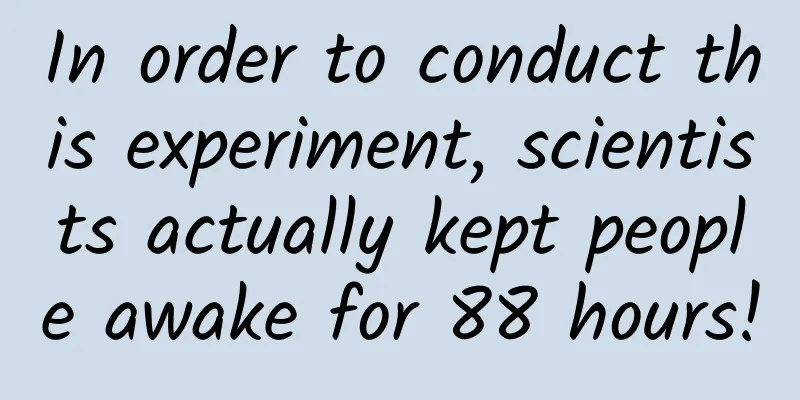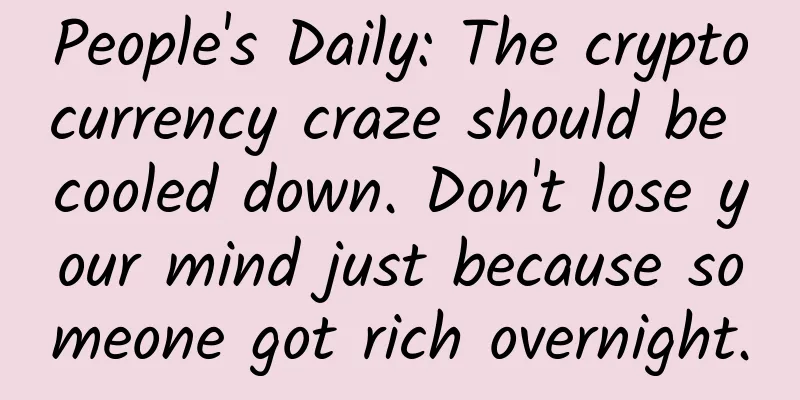In order to conduct this experiment, scientists actually kept people awake for 88 hours!

|
In order to conduct this experiment, scientists actually kept people awake for 88 hours! People are under increasing pressure in life, and discussions about sleep issues such as "sleep time", "sleep quality", "sleep disorders", etc. have frequently become hot searches. Today, I will take you to learn about several experiments on sleep conducted by scientists, and talk about things about sleep! Have you ever experienced instant sleep? What is "instant sleep"? Does it mean "falling asleep as soon as you touch the bed"? Of course not! Instant sleep simply means: poor sleep at night and slow reaction during the day. How can such a simple truth be proven? There was an experiment in which twenty doctors were selected as subjects. They were divided into two groups. The first group consisted of thirteen doctors who had just worked the night shift; the second group consisted of seven doctors who had not worked the night shift and these seven people had enough sleep. The experiment was very simple. Each doctor was asked to watch a TV screen for 5 minutes. During this time, the screen would randomly flash circles and other patterns. Whenever they saw a circle pattern, they had to press a button to indicate that they had received the "circle" signal. The experimental results are shown in the figure below: the doctors who had just worked the night shift and had almost no sleep for a night pressed the button a few seconds after the circle pattern appeared several times, and their reactions became slow; while the doctors who had normal sleep and were not on night shift could react to the graphics in time. Figure 1: Long periods of sleep deprivation can lead to transient sleep episodes [1] Some doctors who worked the night shift even responded four seconds after the circular pattern appeared. This state of the brain not responding for a few seconds is called "transient sleep." Transient sleep usually only lasts for a few seconds and is a defense mechanism of the brain, reminding you to pay attention to rest. The state of "transient sleep" can also occur when driving while fatigued. Once the driver falls asleep, although it is only a few seconds, the car may drive dozens of meters away, which can easily cause a traffic accident. If I force you to sleep 14 hours a day, can you sleep well? What? Force me to sleep for 14 hours? Do you believe that I can sleep for 18 hours after staying up late on the weekend? The following experiment recruited 10 healthy volunteers and forced them to sleep 14 hours a day (even if they couldn't sleep, they had to lie down!). In the first four days, everyone was very happy. I didn't expect someone would pay me to sleep! So everyone slept more than 12 hours a day on average. But the good times didn't last long. In the next two weeks, these volunteers often had to lie in bed for several hours before they could fall asleep, and their sleep time kept shortening. After three weeks, the average sleep time finally remained at around 8 hours and 15 minutes. In other words, the average physiological sleep time of these 10 volunteers was 8 hours and 15 minutes per day. Figure 2 What would happen if volunteers were forced to sleep 14 hours a day? Of course, during the epidemic, if you become a "close contact" and need to be quarantined for fourteen days, you can also spend half a month lying down for 14 hours a day to test how much sleep you need physiologically! Is it useful to catch up on sleep on weekends? Most PhD students and programmers working in laboratories work from 9 a.m. to 12 p.m., and they look forward to having a good sleep on the weekend to "recover" the sleep they lost during the week. In fact, it is quite difficult to make up for the sleep time missed in a week during the two-day weekend. Let's go back to Figure 2. Before forced sleep, the 10 volunteers slept for 7.5 hours a day, while their physiological sleep needs were about 8 hours and 15 minutes, which means that they had an average of about 45 minutes of "sleep debt" every day. After forcing them to sleep for 14 hours a day for 3 weeks, their sleep time was shortened to the physiological sleep needs, and their "sleep debt" was paid off. Therefore, it is difficult to pay off the sleep "debt" during the weekend. I advise everyone who is still working late to ensure high-quality sleep every day! Is a daily nap useful? If you don’t sleep at noon, you will collapse in the afternoon! Companies like Google and Nike encourage their employees to take naps during work hours. Let's take a look at what kind of experiments can prove that "nap is useful"! The next experiment involved 13 volunteers, whose reaction ability was still judged by observing the circular ball on the TV screen and then pressing a button. Long reaction time and pressing the wrong button were counted as reaction errors. In the first experiment, each of them was forced to sleep for 88 hours after sleeping for two times, and then their reaction ability was tested every 2 hours. The experimental results are shown in the figure below. The gray in the figure represents their sleep stage. It can be seen that in the absence of sleep for 88 hours, the number of errors in responding to the graphics was very high and kept increasing. Figure 3 Number of response errors of subjects in the experiment without nap [3] In the second group of experiments, the volunteers were also asked to receive two full 8-hour sleeps, and then they were allowed to take a short 2-hour sleep every 12 hours. By comparing Figures 3 and 4, it can be seen that during these 88 hours, after multiple short sleeps, although the brain would be a little slow when just waking up, overall their brain response effect was not as bad as not sleeping for 88 consecutive hours. Figure 4 Number of response errors in the experiment with napping [3] In the experiment above, the situation of "taking a 2-hour nap every 12 hours" was set, which is impossible in real life. However, it can be proved that even a 20-minute nap can restore our brain's responsiveness to a certain extent. So after a short nap, we can regain our spirits and improve our work efficiency! How to fall asleep quickly? Many people suffer from insomnia. Taking a bath or washing your feet with hot water before going to bed can help you fall asleep easily! If we want to fall asleep quickly, we must start by understanding the human body temperature. An article in Nature magazine proves that the proximal body temperature (subclavian, thigh, stomach, forehead) and distal body temperature (hands and feet) of the human body are often different. Generally, the proximal body temperature is higher than the distal body temperature. Figure 5 Human body temperature at different times To explore the effect of body temperature on falling asleep, researchers measured the body temperature of 18 volunteers at different time points and found that the proximal body temperature began to rise within 1-2 hours before they went to bed (green dot curve in Figure 5), and the distal body temperature began to rise within 1 hour of falling asleep (red dot curve in Figure 5). So if you decide to go to bed two hours later, taking a hot bath to raise your body temperature, or soaking your feet in hot water one hour before going to bed to raise your distal body temperature, can help you fall asleep quickly. (pixabay.com) Scientists have done so many sleep experiments. Although everyone understands the principles, we still need to summarize them here: Ensure the quality of sleep every day so that "instantaneous sleep" will not occur; It is useless to make up for sleep on weekends. It is more important to avoid sleep debt during the week. A short nap can relieve fatigue and improve the quality of work in the afternoon; Taking a bath or soaking your feet before bed can help you fall asleep quickly. References: 1. Saxena AD, George CF P. Sleep and motor performance in on-call internal medicine residents[J]. Sleep, 2005, 28(11): 1386-1391. 2. Dement W C. Sleep extension: getting as much extra sleep as possible[J]. Clinics in sports medicine, 2005, 24(2): 251-268. 3. Van Dongen HPA, Dinges D F. Sleep, circadian rhythms, and psychomotor vigilance[J]. Clinics in sports medicine, 2005, 24(2): 237-249. 4. Kräuchi K, Cajochen C, Werth E, et al. Warm feet promote the rapid onset of sleep[J]. Nature, 1999, 401(6748): 36-37. This article is produced by Science Popularization China-Starry Sky Cultivation Program. Please indicate the source when reprinting |
<<: What is LSD? It once made Steve Jobs addicted
>>: High fever of 40℃! More than 50 people were infected, and almost all of them were confirmed...
Recommend
15 words to explain CPC, CPM, CPA, CPS, CPL...I finally understand them all!
Many newcomers to the industry always fail to dis...
Overseas video marketing promotion: YouTube influencer marketing guide!
YouTube is quickly becoming one of the most popul...
China Life Sciences and Healthcare Industry Survey Results: Current Status and Outlook in 2023
How will your company's business performance ...
Don’t take this kind of voice lightly! Some people are tortured every day…
Compiled by: Gong Zixin Do you live near the airp...
Subaru faces difficulties in China as its technology claims cannot stop sales decline
Automobile is one of the industries with highly in...
Do female scientists who have to take care of children while going out into the field have any career prospects?
To promote field research, fairness issues must b...
New Year's Day Marketing Strategy for the Wedding Photography Industry
Christmas is here, can New Year’s Day be far behi...
Xiaomo AE tutorial for beginners from scratch
Course Catalog ├──AECC2019 Software | └──After Ef...
Can marketing really do more with less money?
There are some things that you cannot think about...
Can the purified water sold in supermarkets really be used for experiments?
Author: Ye Shi Popular Science Author Reviewer: L...
How to write copy that matches your brand positioning?
A few days ago, we held a small activity on the f...
JeecgBoot mobile phone installation and configuration process
[[359692]] The jeecgBoot front-end UI project can...
"Cure" or "cause cancer"? The health truth behind the aspartame controversy
According to Reuters, the artificial sweetener as...
Should I buy an air-cooled or water-cooled CPU cooler for the start of the school year?
The new semester is coming, and new students are ...
Wuliangye denies plans to build cars, says future main business will be making liquor
Recently, an insider of Wuliangye Group gave a cl...









